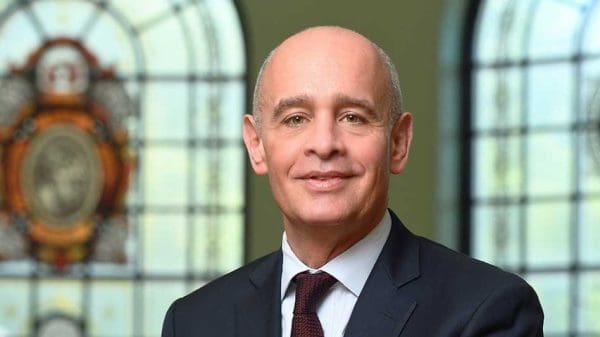As the end of my own “freshman year” as dean approaches, it seems an appropriate moment to reflect on what I have learned about the unique qualities of the Krieger School’s students and faculty since my arrival last September. Two vantage points have given me an intense exposure to my new academic life. I have had the great pleasure of hosting nearly 800 undergraduates as weekly dinner guests in my home over the course of the year and have taken the opportunity to talk with them about their classes, campus life, and what they hope to pursue when they leave us. The second perspective comes from an invigorating series of “Futures Seminars,” mounted by each of the Krieger School’s departments and programs as part of a long-range planning process that will guide our growth over the next five to 10 years.
Thanks to the generosity of the Zellicof family, whose gift supported our Monday night dinners, I have spoken informally and at length with undergraduates from every nook and cranny of the Krieger School. They have come together with faculty members from whom they are taking courses; hence, each group of dinner guests is a community of students with common interests who have taken the evening off to share a meal with faculty they usually see only in the classroom or the lab. Their teachers have a chance to talk informally about their own research, throwing their slides up on my living room wall.
Adam Riess shared the mysteries of dark matter, with commentary from Chuck Bennett and David Kaplan, with several dozen physics majors who wanted to know how these remarkable scientists went about deciding what bold problems to tackle in measuring the expansion of the universe. Michela Gallagher explored new horizons in the study of brain functioning that may unlock the key to Alzheimer’s disease before a crowd of 40 majors in neuroscience and psychology. Jacques Neff was accompanied by students in German, French, and Italian literature who had the opportunity to see the “rough drafts” of texts from some of the greatest writers of the 17th and 18th centuries, their scribbled margin notes and line edits reminding us that even the great masters have their moments of doubt. A group of students in the Writing Seminars had the pleasure of hearing Mary Jo Salter read a new and chilling poem, a meditation on an airline disaster in the making through the voice of a passenger who comes to realize his number is up.
In the dinner line, I heard from students who are pre-meds, with minors in art history, and math majors who are minoring in French literature. Students tell me about the elementary school children they are tutoring in East Baltimore, the modern dance ensembles that are their pride and joy, and the pressures they feel to be the best of the best. In these uncertain times, they worry out loud about what the job market will hold for them. What I have learned about our students as they crowd my living room floor is that they are very serious and extraordinarily hardworking, perhaps more than they should be. They feel responsible to their families to get the most out of their Hopkins experience, to prepare themselves for the competitive tournament of graduate school admission. As much stress as this has created, our students have built a robust culture that is one part friendship, two parts high achievement, and another part the ethic of service. Fulfilled, ambitious for a future of accomplishment, ready to take what the world throws at them: That is how I see our students.
Our Krieger School Futures Seminars have given me a chance to hear faculty in 20 of our 34 departments and interdisciplinary programs (so far) think out loud about what the most pressing intellectual puzzles of the next decade are likely to be. The auditorium of Mason Hall has been packed to the gills. Experts in Islamic art or the great painters of early modern Northern Europe have discussed how these fields enlarge art history as it moves steadily beyond its epicenter in Renaissance Italy. Biologists from the Scripps Institute, Harvard University, and the University of Colorado converged in Mudd Hall to discuss, among other things, the new science of obtaining genomic sequences. Political scientists from Yale, Northwestern, and the University of Chicago argued the relative weight the field should give to the politics of policy versus the philosophical questions that lie behind questions of power.
Krieger School faculty seem excited about the new ideas that are emerging from these encounters; and they take a notable degree of pride as their colleagues in adjacent fields turn out for four-hour marathon sessions.
The Futures Seminars are a vehicle for rethinking where we are going, for planning in a thoughtful and deliberate way how we should invest our intellectual capital, and for discovering ideas that a more conventional approach might overlook. For a new dean, the seminars are also a vehicle for observing what animates my colleagues, discovering what grabs their attention—and for surfacing new ways faculty might combine forces to make even more out of the talent we have assembled in the Krieger School.
Above all, the seminars make it clear that the faculty is a perfect match for the students they teach. On both sides of the experience spectrum, we have an intellectually serious, dedicated community, looking for ways to maximize their impact, ready to think in innovative terms without being faddish, determined to develop a distinctive approach to their calling. It has been a remarkable privilege to join them all.
Katherine S. Newman
James B. Knapp Dean


